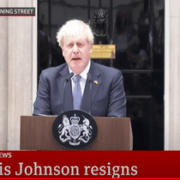The Short Goodbye
Whatever you think of the political reality, and the extraordinary events that led to more than 50 ministers resigning from his government, Boris Johnson’s resignation statement was well written and – given the circumstances – extremely well delivered.
It was also short and to the point.
- Confirmed he was going (eventually), and updated the world on the agreed procedure to find a successor
- Reminded everyone that under his leadership the Conservative party won the 2019 general election with a very large majority
- In 72 words summed up the achievements he is proud of: Brexit, vaccine roll-out, exit from lockdown, ‘leading the west’ standing up to Russia
- Reminding everyone of the levelling up agenda
- A swipe at colleagues for their ‘herd mentality’
- Thanking his family, the party, the civil service and emergency services and special mention for the special protection force (with the pointed observation, they are the one unit that never ever leak)
- And finally ending on an upbeat note about how great the British people are
That is a long list for a short speech.
Others have already commented on the lack of apology and the disconnect from reality: the statement had no mention of the partygate scandal, the constant allegations of lying, and so on. It is clear to me that there was a very good reason for that…from Johnson’s point of view there was nothing to be gained from giving the media or history another round of negativity. Had Johnson apologised again or mentioned the handling of the Chris Pincher affair, that would have been the headline. He knew what he was doing.
In writing that short speech Johnson had one goal. No further negative headlines, remind everyone of the positives. Having a clear goal makes the writing much simpler.
Relentless focus are at the core of running anything well, and yet this most fundamental of disciplines is rarely applied to the words we use.
In both presentation and media training, our trainers will ask what people want to achieve in their interviews or in their talks. It is surprising how many of those we coach do not have a clear answer to that question. Many warn us that they have a tendency to ‘waffle on’, ‘say too much’ or say the same thing ‘several times in several different ways’. But they don’t connect that to the lack of a clearly defined objective.
The skills of journalists put them ahead of the norm on this point. Print journalists count the words they type, and constantly cut words and paragraphs to tighten the writing. They also deliver to very tight deadlines. Broadcasting teaches you to think in seconds. Broadcasters all know the average talking speed when reading a script, is three words per second. If in doubt we time it. Seconds matter in broadcasting.
Economy of words is an undervalued discipline.
Image: YouTube
- Media Savvy Operators Know How to Place a Quote - May 21, 2024
- The Magic of Performance - May 14, 2024
- Our Top Tips: - May 8, 2024




Brevity is key. But, ironically, it takes longer (Mark Twain: “I didn’t have time to write you a short letter, so I wrote you a long one”). It’s why we offer ‘Tighter Writing’ exercises – saying the same thing in fewer words without adversely impacting the meaning – in our writing workshops. And it’s a real skill; legend has it that Ernest Hemingway won a bet by writing the six-word story “For sale: baby shoes. Never worn.” How’s that for impact?